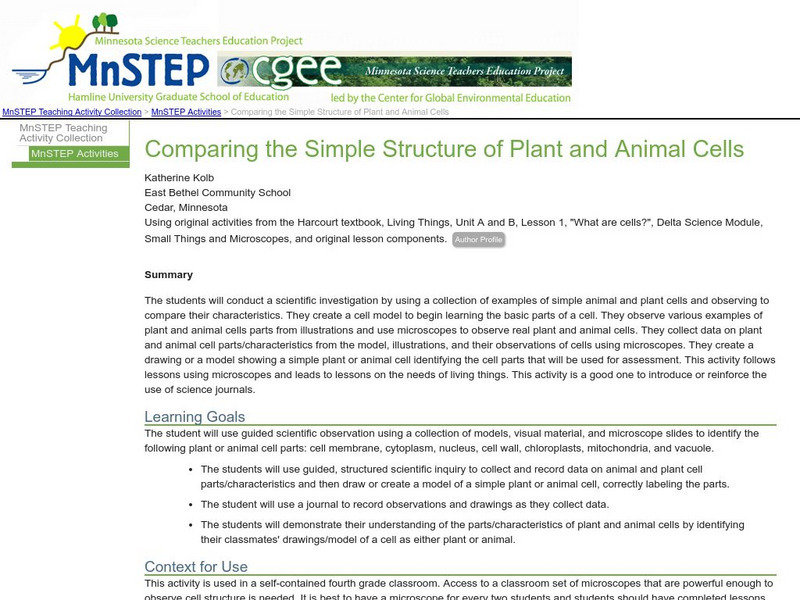Hi, what do you want to do?
Curated OER
Shop projects Summer Smile Program
Students explore the list of products available to make and choose at least 2. In this project lesson students pick and choose their own projects to create in a shop class.
Science Education Resource Center at Carleton College
Serc: Animal and Plant Cell Models and Cell Tour Given to Life Science Students
A biology class is divided into two groups: one an animal cell, and the other one, a plant cell. They are given a list of cell organelles to research and construct in their 9 M X 9 M model. Students must organize and assign duties,...
BiologyWise
Biology Wise: Simple Steps on How to Build a Plant Cell Model
Describes the steps in how to make a model of a plant cell using simple materials and sweet foods like jello and candy.
BiologyWise
Biology Wise: Tips on How to Make a Plant Cell Model
Describes the steps for making a model of a plant cell in two different ways. The first way uses mostly sweet foods and the second way uses a shoebox, clay, and simple materials.
Enchanted Learning
Enchanted Learning: Plant Cell: Animal Cell Anatomy
This is a thorough site which contains a glossary of plant/animal cell anatomy terms. Diagrams of both cells are included along with worksheets to label.
BiologyWise
Biology Wise: Tips on How to Make a 3 D Plant Cell Model
Describes the steps in how to make a model of a plant cell using clay and simple materials found at home. Suggestions for variations are also given.
Cells Alive
Cells Alive!: Plant, Animal, and Bacteria Cell Models
Find animated diagrams that describe both eukaryotic cells and prokaryotic cells. There are models for animal, plant, and bacteria cells.
National Health Museum
Access Excellence: Travel Brochure for a Cell
This activity offers an alternative to cell models to help the students to understand cells and their functions. Students are required to produce a travel brochure that describes a plant or animal cell as if it were a large exhibit or...
National Health Museum
Access Excellence: Cells on a Ceiling
In this lesson plan site, each student is assigned a cell part to research, create, and place inside of a clear plastic drop cloth (the cell) the size of one-half of the classroom ceiling.
Science Education Resource Center at Carleton College
Serc: Comparing the Simple Structure of Plant and Animal Cells
Students use guided scientific observation using a collection of models, visual material, and microscope slides to identify cell organelles. Then they demonstrate their understanding of the parts/characteristics of cells by identifying...
TeachEngineering
Teach Engineering: Photosynthesis Life's Primary Energy Source
This lesson covers the process of photosynthesis and the related plant cell functions of transpiration and cellular respiration. Students will learn how engineers can use the natural process of photosynthesis as an exemplary model of a...
University of Hamburg
University of Hamburg: Polysaccharides
Brief description of polysaccharides includes definition, chemical composition, and formation.











